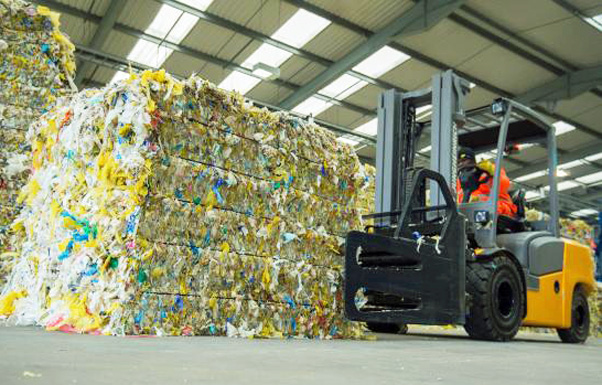PHS Recycles Used Hygiene Products into Fuel for Power Stations
A British waste company is salvaging sanitary products from across the U.K. and Ireland to fuel power stations. The PHS Group said it will pick out items including nappies, tampons, and incontinence pads, known in the industry as absorbent hygiene products, so they can be dried and then burned. The moisture that is squeezed out of the products goes to the sewage system. The squeezed material is then compacted into bales that are burned in the power plants.
PHS removes waste for 90,000 customers, including many offices, schools, and care homes, and tackles 45,000 metric tons of sanitary, nappy, and incontinence waste a year.
The firm, the first in the country to attempt the operation, is hoping to turn all of the 45,000 metric tons of absorbent hygiene products it handles into bales for burning by the end of 2017. Dumping the waste in landfill is the other current option, but the material takes decades to degrade and heavy and rising landfill taxes are aiming to end the practice.
"Hygiene products are an essential part of many of our everyday lives, but disposing of them has always been an issue," said PHS Group CEO Justin Tydeman. "For the first time, we can all enjoy the benefits that the products bring and know that they are disposed of in an environmentally responsible way.
"Whether or not it turns out to be a major source of energy in itself, the key thing is we find a good way to handle what is a complex and growing waste stream," Tydeman continued. "We don’t want this stuff just going into the ground."
Ordinarily hygiene waste products are either sent to landfill or burned. Burning wet waste before it has been dried is expensive because it has to be heated first.
But under PHS’s patented LifeCycle program, the commercial hygiene waste is collected from cinemas, shopping centers, and leisure centers and sent to a specialized facility in the West Midlands. In the new process, the waste is first screened for unwanted items. "The strangest thing we have found so far was a pair of handcuffs," said Tydeman. The material is then shredded and squeezed and packed into bales.
The process is being analyzed by experts from the University of Birmingham, U.K., who will report on how environmentally friendly the new process is in practice, compared with landfill or wet incineration.
PHS noted that hygiene products can take up to 500 years to decompose and are one of the largest contributors to U.K. landfill.
TAPPI
http://www.tappi.org/

